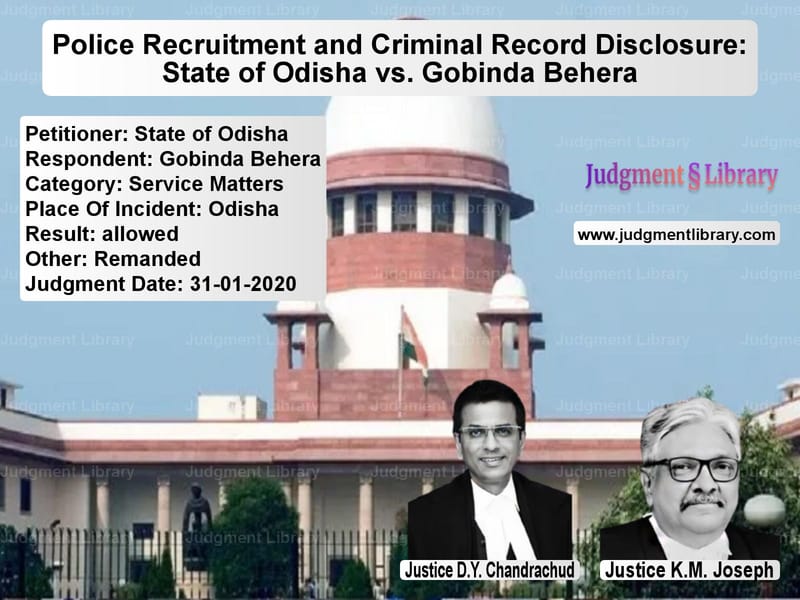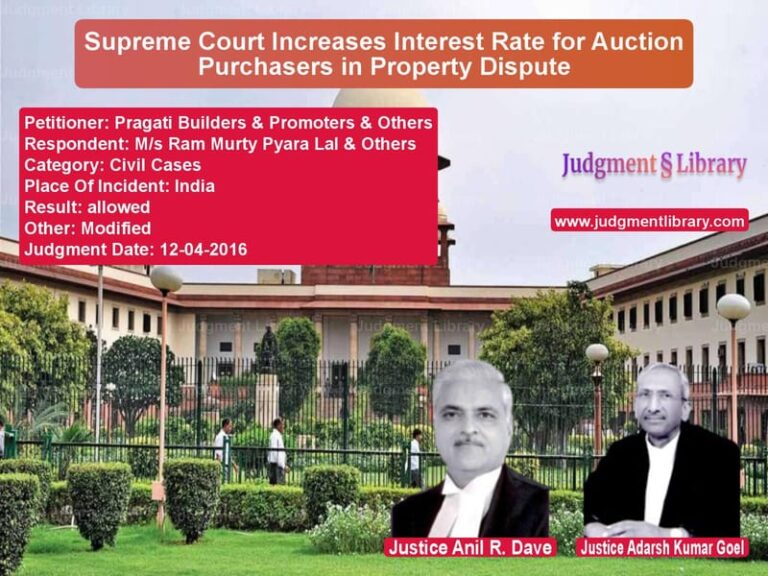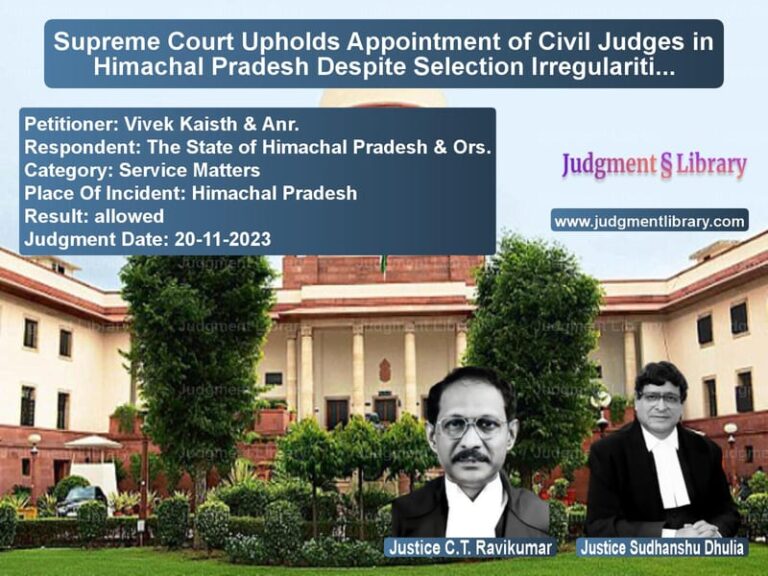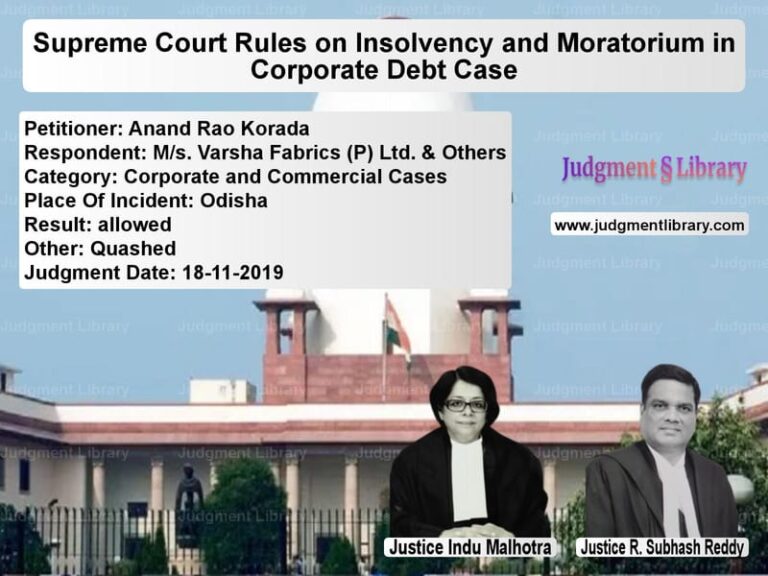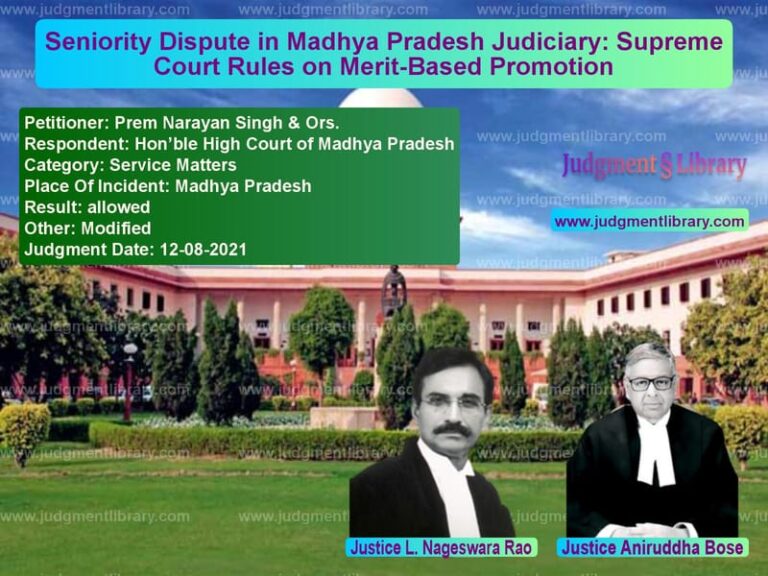Police Recruitment and Criminal Record Disclosure: State of Odisha vs. Gobinda Behera
The case of State of Odisha vs. Gobinda Behera revolves around the dismissal of a police constable who failed to disclose his prior criminal record during recruitment. The Supreme Court had to determine whether the dismissal was justified despite the fact that the criminal case against him was later quashed.
Background of the Case
The respondent, Gobinda Behera, applied for the position of Constable in the 6th IR Battalion, Khurda on October 29, 2011. In his application, he declared that he had never been involved in a criminal case. Based on this declaration, he was appointed on December 14, 2011.
However, during a routine background verification, the Superintendent of Police, Puri, informed the recruitment authorities that Behera had been involved in Balanga PS Case No. 46 of 2009, which included serious charges under Sections 294, 323, 324, 326, 336, 337, 427, 379, 506, and 34 of the Indian Penal Code (IPC).
Upon discovering this, the authorities issued a notice to Behera on July 6, 2012, seeking an explanation for his false statement. Subsequently, his appointment was terminated on July 26, 2012. Aggrieved by this decision, Behera approached the Odisha Administrative Tribunal, which rejected his plea. However, the Orissa High Court overturned the Tribunal’s decision, leading the State of Odisha to appeal before the Supreme Court.
Legal Issues and Proceedings
The key legal questions before the Supreme Court were:
- Whether failing to disclose a criminal case justified dismissal from police service.
- Whether the quashing of the criminal case after dismissal negated the suppression of facts.
- Whether the decision of the Orissa High Court to reinstate the respondent was legally valid.
Arguments of the Appellants (State of Odisha)
The State of Odisha made the following key arguments:
- The appointment of a police constable is a position of high trust, and candidates must be truthful in their declarations.
- The respondent’s involvement in a serious criminal case, even if later quashed, was a material fact that should have been disclosed.
- The employer had the right to assess a candidate’s suitability based on their antecedents and conduct.
- The High Court erred in setting aside the Tribunal’s decision and ordering reinstatement.
Arguments of the Respondent (Gobinda Behera)
The respondent countered with the following arguments:
- At the time of applying for the job, the case had not resulted in a conviction, and he was unaware that it would impact his eligibility.
- The criminal case against him was quashed in 2013 by the High Court under Section 482 of the Criminal Procedure Code (CrPC), following a compromise between the parties.
- The suppression of his criminal record was unintentional and should not be treated as a serious misconduct.
- The High Court had rightly held that he deserved reinstatement since the criminal proceedings no longer existed.
Key Observations of the Supreme Court
The Supreme Court analyzed the case based on the following considerations:
- The importance of honesty in police recruitment.
- Whether suppression of material facts justified termination.
- The impact of quashing of the criminal case after dismissal.
After reviewing the case, the Court made the following findings:
- The respondent had intentionally suppressed his criminal record.
- The nature of the charges against him was not trivial and involved serious offenses.
- The employer has a right to consider the antecedents of a candidate when assessing suitability for a law enforcement position.
- The High Court’s decision to reinstate him was incorrect as it ignored the principles of honesty and integrity required for police service.
Verbatim Court Findings
The Supreme Court, while setting aside the High Court’s ruling, stated:
“The duties of a police constable bear intrinsically on the maintenance of law and order and the personal liberty of citizens. It is reasonable to expect that an applicant for such a position should be truthful in disclosing material facts about his antecedents.”
Additionally, the Court observed:
“Despite being involved in a criminal case, the respondent suppressed these facts from the authorities while applying for the post of a Constable. The quashing of the case based on a compromise does not absolve him of the suppression.”
Final Judgment
The Supreme Court ruled in favor of the State of Odisha and upheld the Tribunal’s decision:
- The order of the Orissa High Court was set aside.
- The termination of the respondent from police service was upheld.
- The respondent was deemed unfit for reinstatement.
Final Verdict: Appeal allowed, termination upheld.
Petitioner Name: State of Odisha.Respondent Name: Gobinda Behera.Judgment By: Justice D.Y. Chandrachud, Justice K.M. Joseph.Place Of Incident: Odisha.Judgment Date: 31-01-2020.
Don’t miss out on the full details! Download the complete judgment in PDF format below and gain valuable insights instantly!
Download Judgment: State of Odisha vs Gobinda Behera Supreme Court of India Judgment Dated 31-01-2020.pdf
Direct Downlaod Judgment: Direct downlaod this Judgment
See all petitions in Public Sector Employees
See all petitions in Recruitment Policies
See all petitions in Termination Cases
See all petitions in Judgment by Dhananjaya Y Chandrachud
See all petitions in Judgment by K.M. Joseph
See all petitions in allowed
See all petitions in Remanded
See all petitions in supreme court of India judgments January 2020
See all petitions in 2020 judgments
See all posts in Service Matters Category
See all allowed petitions in Service Matters Category
See all Dismissed petitions in Service Matters Category
See all partially allowed petitions in Service Matters Category

